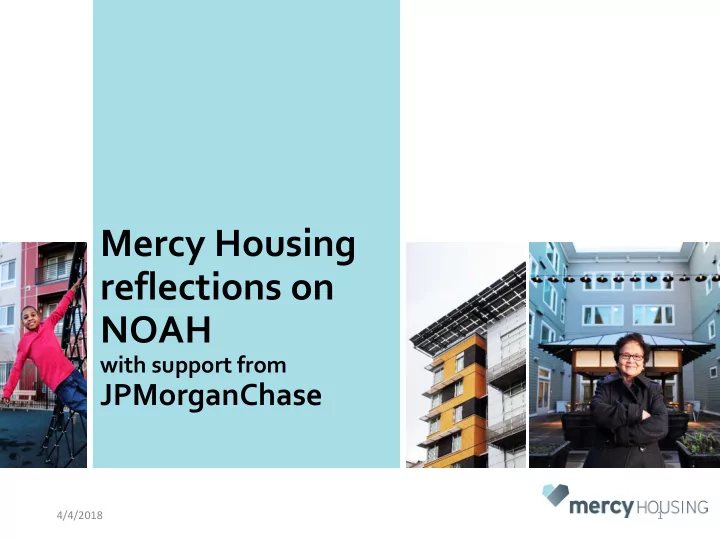

Mercy Housing reflections on NOAH with support from JPMorganChase 4/4/2018 1
4/4/2018 2 Why d y did we engage i in NOAH/W /Wor orkfor orce H e Housing To support communities and families where essential workers such • as teachers, firefighters, nurses aides, and maintenance workers drive extraordinary distances to work due to the lack of housing they can afford To preserve the thousands of units of apartment units that serve • working families from either being demolished, or sold to ‘flippers’ who buy properties, improve them for high end renters, and push existing residents out. To add balance to Mercy’s portfolio which is heavily dependent on • LIHTC and government programs in an unstable political environment with questionable commitment to affordable housing. JP Morgan Chase contributed seed capital in 2 grants totaling $3.5M • to invest in this asset class and leverage other capital.
What was the Mercy Housing experience? • Over 2.5 years, Mercy Housing reviewed 123 properties provided through brokers (in detail) • Resulted in 65 offers with 32 best and final offers • Resulted in 3 acquisitions from the bid process; additional 5 from direct purchaser relationships 3 4/4/2018
Mercy Housing stepped out of NOAH to re-assess • Conflicting goals between property operations, asset management and development create challenges • Market analysis and assumptions require a different understanding of the prospective tenant base • Broker relationships were critical to this market and needed to be understood • Mercy wanted to experience/understand the performance of NOAH properties before continuing 4 4/4/2018
Why is this so hard? • Non profits priced out of this “frothy” market • Race to the closing table that requires fast due diligence decisions and ready capital that is priced right • Requires minimal renovation ($5K -$15K/unit) to make the numbers work-hard to reconcile what is not getting done • Underwriting assumptions require uncomfortable market risk • Non-profit governance does not allow for risk taking in the same manner as an investor driven capital fund 5 4/4/2018
What have we learned? • Successful transactions are coming from known and/or socially motivated sellers – success requires a different approach • Right priced equity ideally means not more than a 3% investor return • It takes longer to meet financial return targets than expected but the returns do get there • Property management practices are not the same as in a 100% restricted affordable portfolio – understand that from the beginning • Understand your current tenant base – the real occupancy rate; # of over occupied units, etc. – after all, we are in this to create stability. 6 4/4/2018
Recommend
More recommend